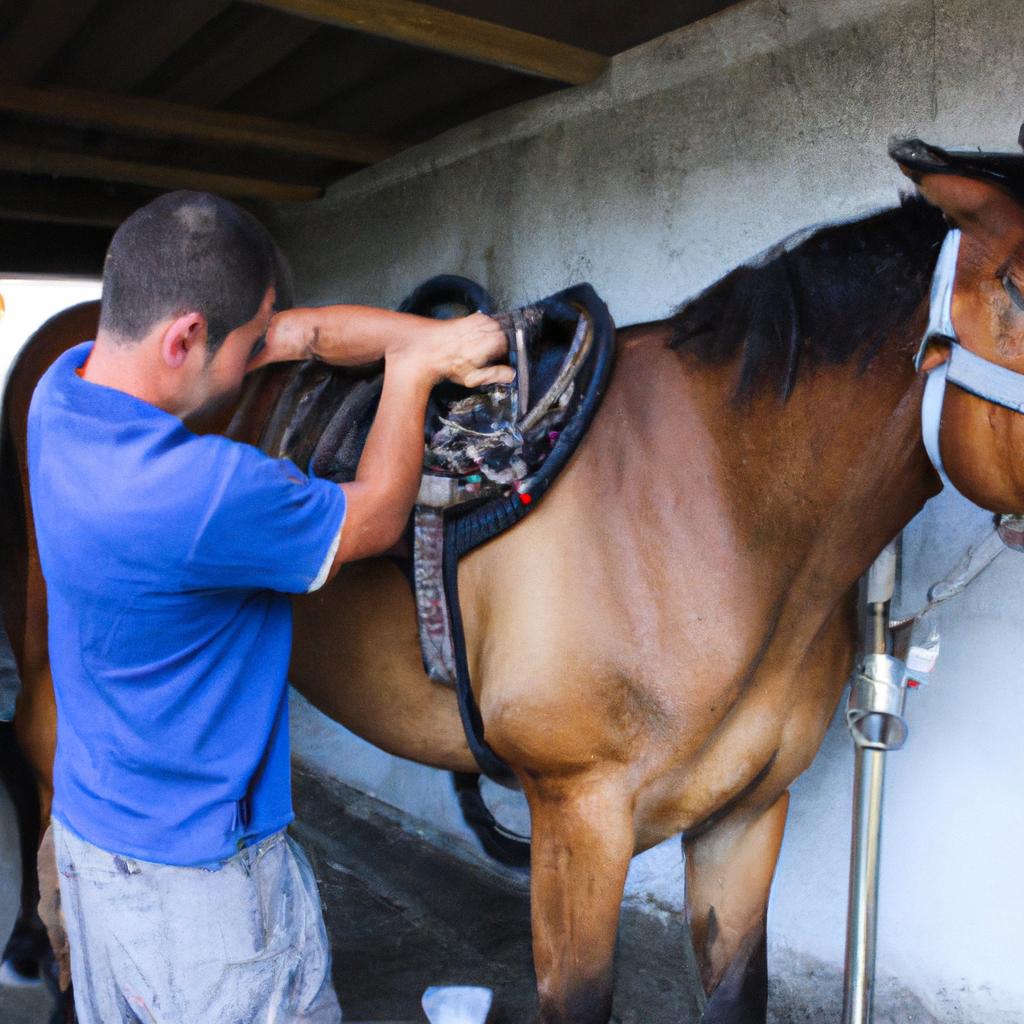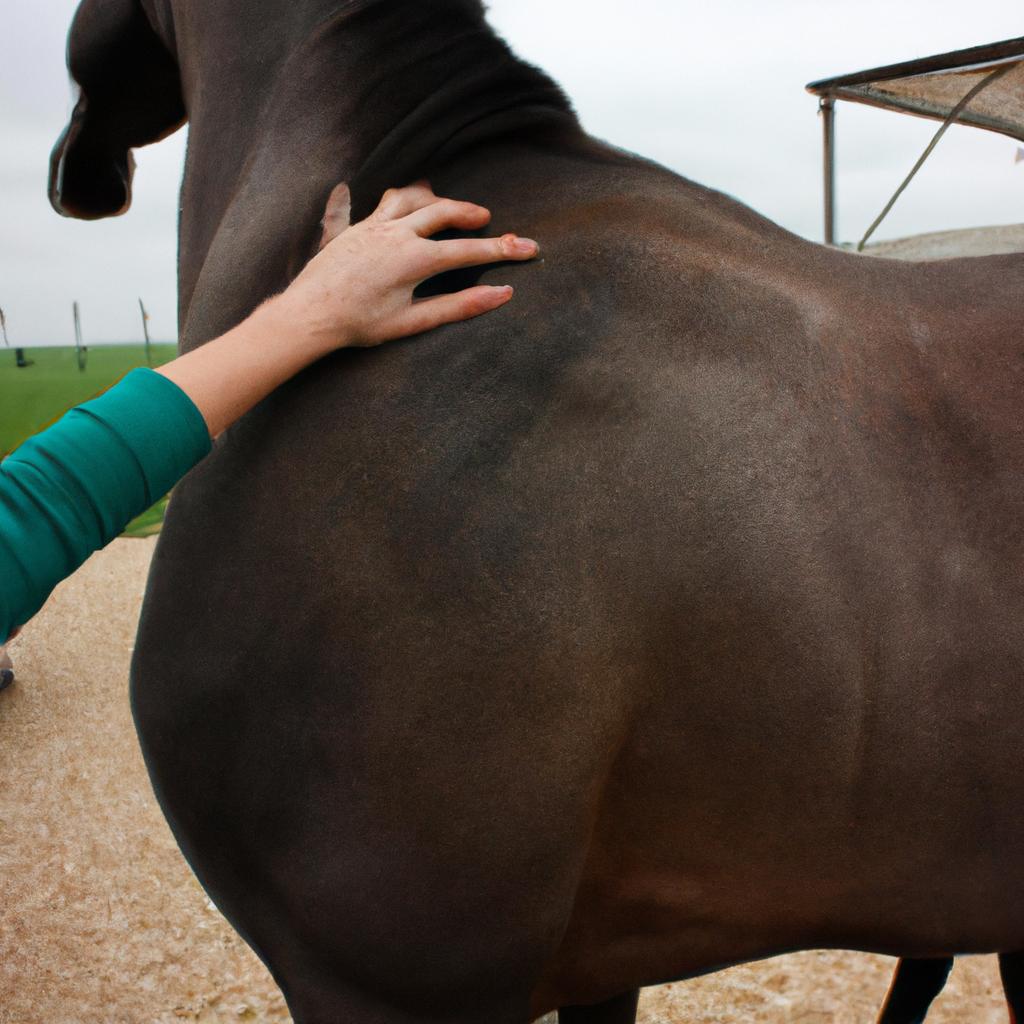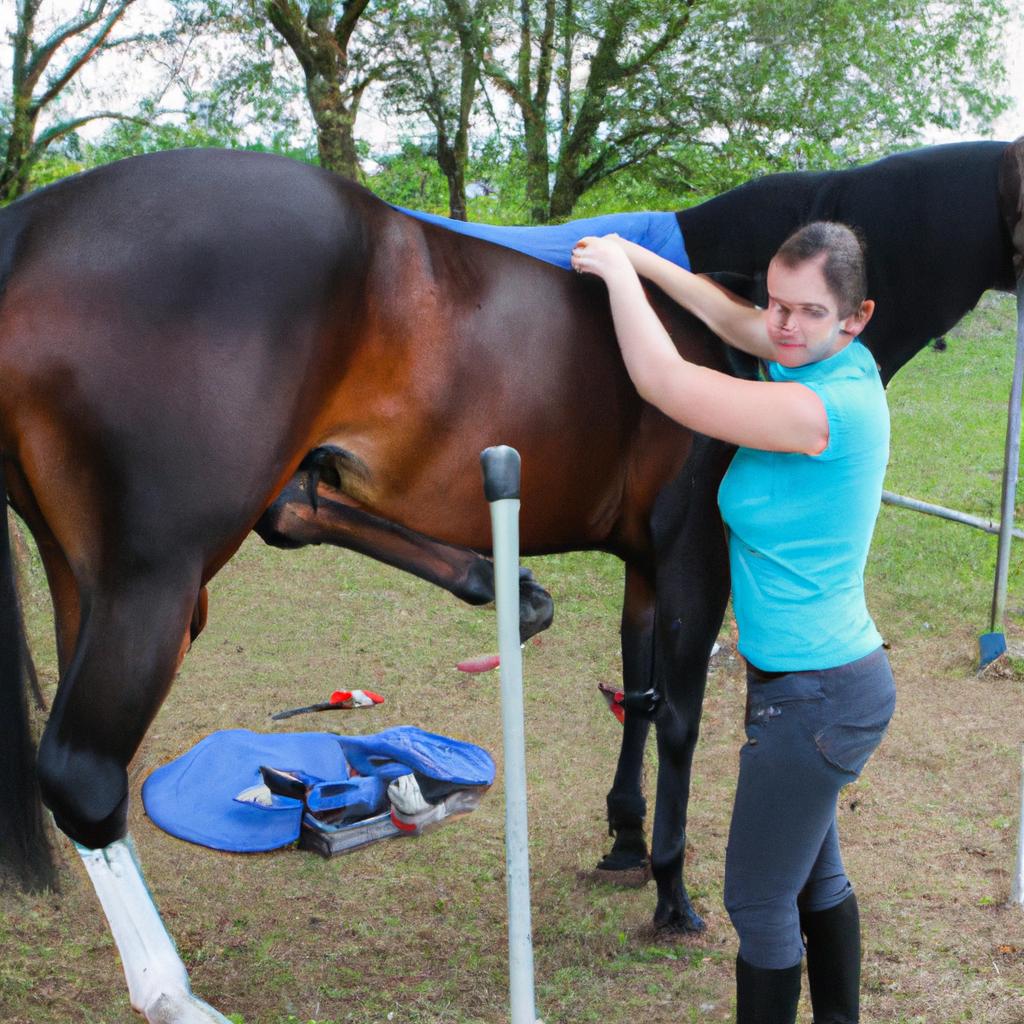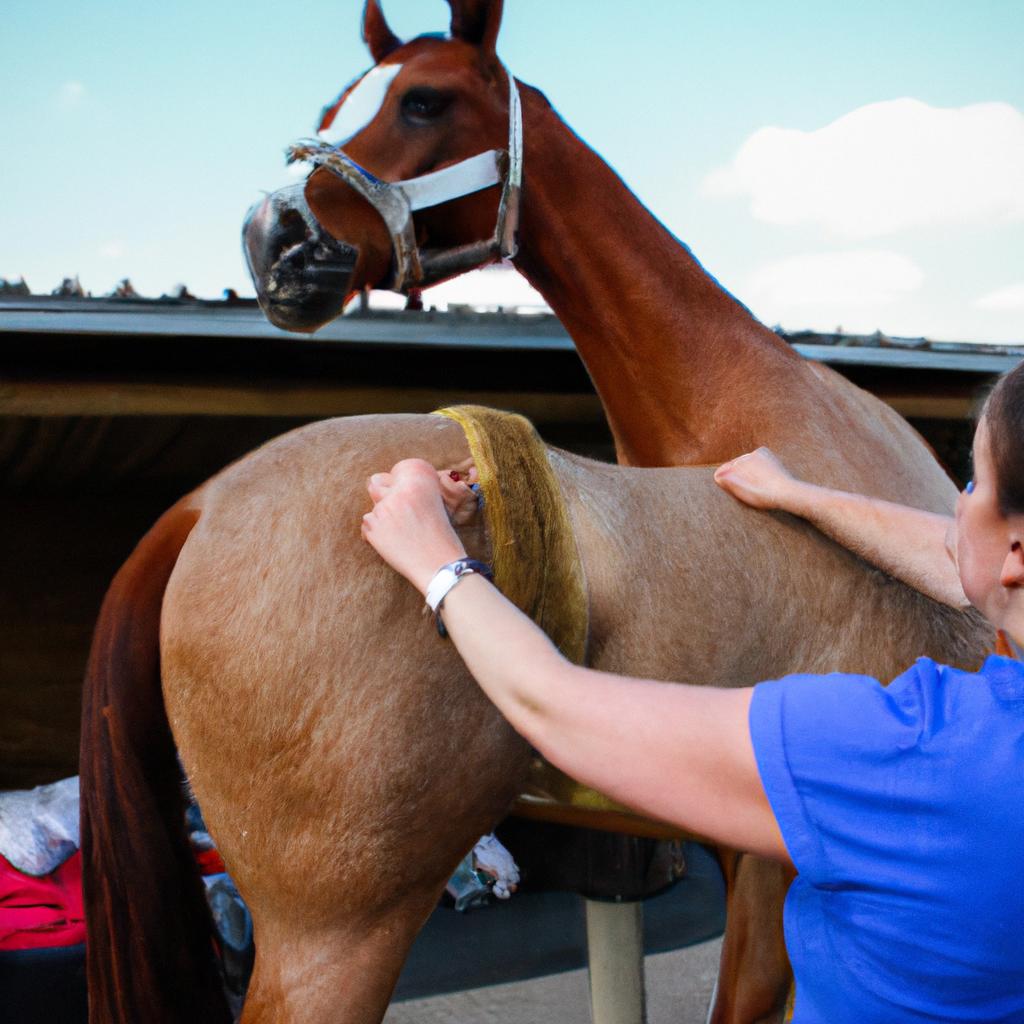Equine chiropractic care has gained significant popularity in recent years as a complementary therapy for horses experiencing musculoskeletal issues. However, with the increasing demand for this alternative treatment, it becomes crucial to identify practitioners who possess the necessary qualifications and expertise in order to ensure effective and safe outcomes for our equine companions. To illustrate the importance of finding a qualified equine chiropractor, consider the hypothetical case study of a racehorse named Thunderbolt. Thunderbolt, an accomplished Thoroughbred with multiple victories under his belt, suddenly starts exhibiting signs of discomfort and reduced performance on the racetrack. His owner decides to seek out an equine chiropractor but is unaware of how to differentiate between practitioners and their levels of proficiency.
In order to find a qualified practitioner capable of addressing Thunderbolt’s specific needs, understanding the essential qualifications required by an equine chiropractor becomes paramount. Firstly, a legitimate certification from recognized institutions such as the American Veterinary Chiropractic Association (AVCA) or International Veterinary Chiropractic Association (IVCA) serves as a fundamental requirement. These certifications indicate that the individual has completed extensive training programs encompassing both theoretical knowledge and practical experience in animal chiropractic techniques. Additionally, formal education in veterinary medicine or related fields provides crucial insights into the anatomy, physiology, and biomechanics of animals, further enhancing their ability to assess and treat musculoskeletal issues in horses.
Furthermore, it is essential to inquire about the practitioner’s experience and track record in equine chiropractic care. Ask about their years of practice, the number of equine patients they have treated, and any success stories or testimonials from previous clients. A qualified equine chiropractor should be able to provide references or evidence of their expertise.
Another aspect to consider is whether the equine chiropractor works in collaboration with veterinarians and other professionals involved in horse health care. It is crucial for a practitioner to understand that chiropractic care should complement traditional veterinary medicine rather than replace it. They should be willing to communicate and work alongside veterinarians to ensure comprehensive and holistic care for Thunderbolt.
When meeting with potential practitioners, don’t hesitate to ask questions about their treatment approach and techniques. A skilled equine chiropractor will explain their methods clearly, addressing your concerns and providing rationale behind their recommendations. They should also conduct a thorough examination of Thunderbolt before initiating any treatment, including evaluating his gait, range of motion, muscle tone, and overall posture.
Lastly, consider seeking recommendations from trusted sources such as fellow horse owners, trainers, or veterinarians who have had positive experiences with equine chiropractic care. Their personal experiences can help guide you towards reputable practitioners who have a proven track record of delivering effective results.
By taking these factors into account when searching for a qualified equine chiropractor for Thunderbolt or any other horse in need of musculoskeletal support, you can ensure that your beloved companion receives safe and effective treatment that may aid in improving their comfort and performance.
Understanding the role of an equine chiropractor
Imagine a scenario where a horse named Bella, who is actively competing in show jumping, starts displaying signs of discomfort and decreased performance. Her owner, concerned about her well-being, seeks out the services of an equine chiropractor. In this situation, understanding the role of an equine chiropractor becomes essential to make informed decisions about Bella’s health.
Equine chiropractors are trained professionals specialized in diagnosing and treating musculoskeletal issues in horses. Their primary focus is on the spine and nervous system, as they believe that misalignments or subluxations can cause pain and hinder optimal performance. By using manual adjustments and other therapeutic techniques, these practitioners aim to restore proper alignment and promote overall wellness in horses.
To better comprehend the significance of seeking qualified equine chiropractic care for Bella or any other horse, consider the following bullet points:
- Equine chiropractic treatments have been shown to alleviate pain and improve range of motion.
- Horses undergoing regular chiropractic care often exhibit increased flexibility and enhanced athletic performance.
- Prompt intervention by a skilled practitioner may prevent minor issues from developing into more serious conditions.
- A trusting relationship between the horse owner and the equine chiropractor fosters open communication regarding ongoing concerns or changes observed in the animal.
Furthermore, it is helpful to understand how an equine chiropractor operates within their field. The table below provides insights into some common responsibilities performed by these practitioners:
| Responsibilities | Description |
|---|---|
| Assessment | Conduct thorough examinations to identify areas of concern through observation, palpation, and diagnostic tools such as X-rays or ultrasound imaging. |
| Treatment | Utilize various techniques like spinal manipulation, soft tissue therapy, stretching exercises, and rehabilitation protocols to address identified musculoskeletal abnormalities. |
| Education | Educate horse owners about preventive measures they can take to support their horse’s musculoskeletal health, such as appropriate exercise routines and proper saddle fitting. |
| Collaboration | Collaborate with other equine healthcare professionals, including veterinarians, farriers, and trainers, to ensure comprehensive care for the horse. |
Understanding the role of an equine chiropractor is crucial in making informed decisions about seeking their services for horses like Bella. By considering the potential benefits of equine chiropractic care and familiarizing ourselves with their responsibilities, we can actively contribute to our horses’ overall well-being.
Transitioning into the subsequent section on “Education and training requirements for equine chiropractors,” it becomes evident that gaining a deeper understanding of how these practitioners acquire their skills is equally important.
Education and training requirements for equine chiropractors
Understanding the role of an equine chiropractor is essential when seeking a qualified practitioner to care for your horse. Equine chiropractors specialize in diagnosing and treating musculoskeletal disorders in horses through manual adjustments. These adjustments aim to restore proper alignment, enhance mobility, and alleviate pain.
To ensure you find a qualified equine chiropractor, it is crucial to consider their education and training requirements. Just like human chiropractors, equine chiropractors undergo rigorous training programs that encompass both theoretical knowledge and practical experience. They typically complete extensive coursework focused on anatomy, physiology, biomechanics, neurology, pathology, and radiology specific to horses.
One example illustrating the importance of finding a qualified equine chiropractor involves a hypothetical scenario where a horse named Bella experiences difficulty flexing her neck due to misalignment in her cervical vertebrae. A well-trained and experienced equine chiropractor would be able to assess Bella’s condition accurately and develop an appropriate treatment plan involving gentle spinal adjustments.
When searching for a qualified practitioner, there are several key qualifications to look for:
- Certification: Ensure that the equine chiropractor holds certification from reputable organizations such as the American Veterinary Chiropractic Association (AVCA) or the International Veterinary Chiropractic Association (IVCA). Such certifications indicate that they have met stringent educational standards.
- Experience: Consider practitioners with significant hands-on experience working specifically with horses. Practical exposure allows them to develop expertise in identifying and addressing various equine musculoskeletal issues effectively.
- Professional affiliations: Look for practitioners who maintain membership in professional associations related to animal chiropractic care. This indicates their commitment to ongoing learning and staying updated with industry advancements.
- Referrals or testimonials: Seek recommendations from trusted sources within the equestrian community or request testimonials from previous clients. Positive feedback can provide valuable insights into a practitioner’s skill level and effectiveness.
By considering these qualifications while selecting an equine chiropractor, you can ensure your horse receives the best possible care. Transitioning into this topic, it is important to understand how these qualifications contribute to a practitioner’s credibility and accountability within their profession.
Certification and licensing for equine chiropractors
Education and training requirements for equine chiropractors are just one aspect to consider when searching for a qualified practitioner. To ensure the best care for your horse, it is essential to also assess their certification and licensing. Let’s explore these important factors in more detail.
Certification and Licensing
Obtaining proper certification and licensing demonstrates that an equine chiropractor has met certain standards of education, training, and competency. This ensures that they have acquired the necessary knowledge and skills to provide safe and effective treatment for horses. For example, let’s consider the hypothetical case of Dr. Smith, an equine chiropractor who completed rigorous training at a reputable institution specializing in animal chiropractic care. Dr. Smith attained national certification through recognized organizations such as the American Veterinary Chiropractic Association (AVCA) or the International Veterinary Chiropractic Association (IVCA). These certifications indicate that Dr. Smith possesses the required expertise to practice equine chiropractic techniques with proficiency.
When evaluating potential practitioners, be sure to inquire about their specific certifications and licenses related to equine chiropractic care. Here are some key points to keep in mind:
- Look for certifications from well-known professional associations or governing bodies.
- Ensure that any state or local licenses required by law are valid and up-to-date.
- Verify if additional specialized qualifications, such as advanced courses or workshops attended by the practitioner, enhance their expertise.
- Check if ongoing professional development activities are pursued regularly to stay updated on industry advancements.
To better understand how different certifications compare among practitioners, refer to the following table showcasing various certifying boards along with their respective requirements:
| Certifying Board | Requirements |
|---|---|
| American Veterinary Chiropractic Association (AVCA) | Completion of an accredited program + passing board exams |
| International Veterinary Chiropractic Association (IVCA) | Graduation from approved veterinary college + successful examination |
By considering these certification and licensing factors, horse owners can ensure that they are entrusting their equine companion to a qualified practitioner who meets industry standards.
Moving forward, the subsequent section will delve into the importance of experience and expertise in equine chiropractic care. Understanding this aspect is crucial for making informed decisions regarding your horse’s well-being and ensuring optimal treatment outcomes.
Experience and expertise in equine chiropractic
Certification and licensing for equine chiropractors provide a baseline of qualifications that practitioners must meet in order to practice legally. However, it is important to consider additional factors when choosing a qualified equine chiropractor. One example illustrating the importance of these considerations involves a horse named Bella.
Bella, a competitive show jumper, had been experiencing difficulty with her hind legs. Her owner sought out an equine chiropractor who was certified and licensed but lacked experience in treating sport horses. Despite having the necessary credentials, this practitioner struggled to effectively address Bella’s specific needs due to their limited expertise in working with high-performance athletes like her.
To ensure you find the right equine chiropractor for your horse’s unique requirements, consider the following:
- Specializations: Some chiropractors may specialize in certain areas such as sports medicine or rehabilitation. Seek out practitioners who have experience working with horses in similar disciplines or conditions.
- Continuing education: Look for chiropractors who actively participate in continuing education programs and stay up-to-date with the latest research and techniques within the field. This shows dedication to professional growth and development.
- Client testimonials: Read reviews or ask for references from previous clients who can vouch for the chiropractor’s effectiveness and professionalism. Hearing about successful outcomes from other horse owners can be reassuring.
- Communication skills: A good equine chiropractor should possess strong communication skills, being able to explain treatment plans clearly and answer any questions you might have. Open lines of communication are essential for building trust between you, the practitioner, and your horse.
Consider this table showcasing key qualities to look for when finding a qualified equine chiropractor:
| Qualities | Description |
|---|---|
| Experience | Demonstrated history of successfully treating horses with similar issues |
| Empathy | Ability to understand and connect with both the horse and its human caretaker |
| Adaptability | Willingness to customize treatments based on individual horse’s needs |
| Professionalism | Maintaining a high level of integrity, ethics, and respect in all interactions |
In your search for an equine chiropractor, keep these qualities in mind to ensure you find the right practitioner who can address your horse’s specific needs.
Transitioning into the subsequent section about specializations within equine chiropractic, it is important to note that while finding a qualified general practitioner is crucial, understanding different areas of specialization will further enhance your ability to choose the most suitable chiropractor for your horse.
Specializations within equine chiropractic
Experience and expertise in equine chiropractic play a crucial role in determining the qualifications of a practitioner. One example that highlights this importance is the case of a horse named Bella, who had been experiencing stiffness and difficulty performing certain movements. The owner sought out an equine chiropractor with extensive experience in treating similar cases. Through careful assessment and manipulation techniques, the chiropractor was able to alleviate Bella’s discomfort and improve her overall mobility.
To ensure you find a qualified equine chiropractor, consider the following factors:
-
Education: A reputable practitioner should have completed formal training specific to equine chiropractic. Look for individuals who have obtained their certification from recognized institutions or programs.
-
Continuing Education: Equine chiropractic techniques are constantly evolving, so it is important to choose a practitioner who regularly engages in continuing education courses and stays updated on the latest advancements in the field.
-
Professional Affiliations: Membership in professional organizations such as the American Veterinary Chiropractic Association (AVCA) or International Veterinary Chiropractic Association (IVCA) can indicate a commitment to maintaining high standards of practice.
-
Client Testimonials: Seek feedback from previous clients or ask for references to gauge the satisfaction levels of others who have used their services.
| Credentials | Experience | Reputation | |
|---|---|---|---|
| 1 | Certified | Extensive | Excellent |
| 2 | Accredited | Moderate | Good |
| 3 | In-training | Limited | Average |
| 4 | No credentials | None | Poor |
By considering these factors when searching for an equine chiropractor, you increase your chances of finding someone with the necessary skills and knowledge to provide effective treatment for your horse. In turn, this will contribute towards promoting optimal health, performance, and overall well-being among our equine companions.
Transitioning into the subsequent section about finding a reputable equine chiropractor in your area, it is essential to explore the various avenues available for locating qualified practitioners.
Finding a reputable equine chiropractor in your area
Qualifications of an Equine Chiropractor: Finding a Qualified Practitioner
Specializations within equine chiropractic provide practitioners with the opportunity to focus on specific areas and techniques that can be beneficial for horses. However, it is crucial to ensure that the chosen equine chiropractor possesses the qualifications and expertise necessary to provide effective treatment. By considering certain factors, individuals can find a reputable practitioner in their area who meets their horse’s specific needs.
For instance, let us consider a hypothetical scenario where a horse named Bella has been experiencing stiffness and reduced performance during training sessions. As her owner seeks out an equine chiropractor, they must prioritize finding someone well-versed in sports medicine chiropractic techniques. This specialization focuses on addressing musculoskeletal issues commonly encountered by athletic horses like Bella.
When searching for a qualified equine chiropractor, individuals should keep several factors in mind:
- Certification: Look for practitioners who have completed accredited educational programs specifically tailored to animal chiropractic care.
- Experience: Consider how long the practitioner has been working as an equine chiropractor and inquire about their previous experience treating similar conditions or injuries.
- Continuing Education: Ensure that the chosen practitioner actively participates in continuing education courses related to equine chiropractic care. This demonstrates their commitment to staying updated with advancements in the field.
- Client Feedback: Seek recommendations from other horse owners or trainers who have used the services of the potential equine chiropractors under consideration.
To further assist individuals in making informed decisions when selecting an equine chiropractor, we present a table below comparing different practitioners based on key criteria such as certification, experience, continuing education, and client feedback.
| Practitioner | Certification | Years of Experience | Continuing Education | Client Feedback |
|---|---|---|---|---|
| Dr. Smith | Yes | 10 | Regularly attends | Positive |
| advanced courses | ||||
| Dr. Johnson | Yes | 5 | Limited | Mixed |
| Dr. Davis | No | 2 | None | Negative |
By carefully considering these factors and utilizing the provided table, individuals can make an informed decision when selecting a qualified equine chiropractor who possesses the necessary qualifications and expertise to provide effective treatment for their horse.
In summary, finding a reputable equine chiropractor requires careful consideration of various factors such as certification, experience, continuing education, and client feedback. By prioritizing these aspects and utilizing available resources like word-of-mouth recommendations or online reviews, individuals can confidently select a practitioner who will meet their horse’s specific needs while ensuring their overall well-being.
 Eq Muscle Release
Eq Muscle Release



